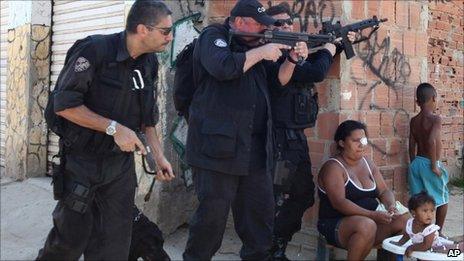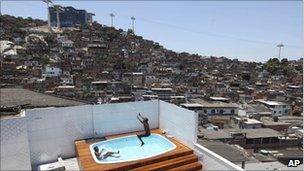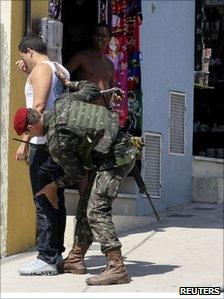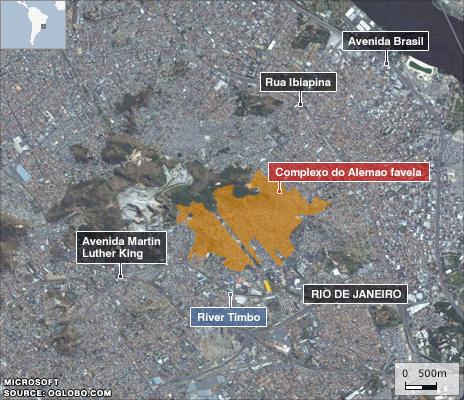Rio police raids: Fatal blow to favela drug gangs?
- Published

Will Sunday's police operation bring long-lasting security for residents
With their takeover of the Complexo do Alemao favela in Rio de Janeiro, Brazilian security forces have managed something few believed possible.
Alemao is indeed complex: it is made up of a dozen or so different favelas with a population of some 65,000 people. The shantytown's narrow and winding streets were thought to be inaccessible to government forces.
Until Sunday, the area had been a perfect safe haven for drug traffickers to run their business.
But in under two hours and with a relatively low number of deaths - only three officially confirmed so far - Rio de Janeiro state police and federal troops quickly moved in and seized control.
Brazilian authorities are euphoric. For them, the operation marks a major turning point in Rio's decades-long battle against the drug cartels that dominate and terrorise impoverished communities.
There is already talk of taking control of other criminal strongholds, such as in the favelas of Rocinha and Vidigal. They, like Complexo do Alemao, are close to tourist sites and venues that will host the World Cup in 2014 and Olympic Games in 2016.
Other voices are more cautious, saying that it is too soon to know exactly how big a blow this has been to criminal factions.
Pacifying police
However, Sunday's security operation cannot be dismissed as business as usual in Rio's crime wars.
The takeover of Complexo do Alemao was not an isolated event, but part of the state government's long-term plan to break down drug cartels in favelas.
Two years ago, the Rio government implemented what are known as Pacifying Police Units, or UPPs, that took a different approach to tackling crime in the shantytowns.
Instead of fighting criminals from the outside, UPPs moved in the communities, widening the authorities' ability to reach previously lawless areas.
This helped police forces to sort out criminals from law-abiding residents. Previously there was not much distinction among them in police operations, which helped turn honest favela residents against security forces.
The UPPs also prevented corrupt policemen, widely known as "militias", from moving into crime areas where there was a vacuum of power.
Since 2008, UPPs successfully pacified many favelas and expelled drug traffickers, who were then forced to move to different areas.
Many criminals sought refuge in Complexo do Alemao, where there is not yet a UPP in place. Nicknamed "Gaza Strip", it was considered too big and too dangerous for government forces ever to intervene.
Authorities say that discontent with the UPPs provoked criminal gangs to start the wave of violence in Rio last week that left more than 30 people dead before police brought the unrest under control.
Amid the violence, the government saw a chance to move into Complexo do Alemao. Unprepared, criminal gangs were surprised and offered little resistance.
Unity
Another aspect of Sunday's operation was the co-operation between state and federal governments to tackle crime, with the armed forces backing up the police.

Did Sunday's raid overturn the might of the wealthy drug dealers?
Rio de Janeiro Governor Sergio Cabral has now requested that soldiers remain in Complexo do Alemao until early next year, to allow the authorities time to set up a UPP there.
The operation also had an impact on some drug traffickers and criminal factions such as Comando Vermelho (Red Command) and Amigos dos Amigos (Friends of Friends) long thought to be untouchable.
One alleged crime boss, taken into custody by police, wet himself - an image shown on television.
Another channel showed a luxurious house in the shantytown that belonged to another suspected drug lord. After the police concluded their search, local children turned the private swimming pool into a public recreational area.
The seizure of weapons and more than 30 tonnes of marijuana and cocaine are also likely to have dealt a major blow to drug dealers.
Euphoria and caution
Officials were clearly ecstatic at the turn of events.
Jose Mariano Beltrame, Rio's security secretary and one of the UPP's creators, said the operation had broken the myth that Complexo do Alemao was "invincible" as "the heart of evil".
Mr Cabral, the governor, said a page in Rio's history had been turned; Rio's Mayor Eduardo Paes has said 28 November should be declared the "Refounding of Rio" day.

Tighter security is set to be in place for the foreseeable future
The thinking is that if criminals are pursued from one favela to the next, they will gradually lose their power and eventually run out of places to run.
If this is true, Complexo do Alemao's occupation could prove to be a turning point.
But there are voices of concern.
President Luiz Inacio Lula da Silva hailed the operation as an important "first step" in the battle against crime, but said that no one yet knew whether more criminals were still hiding in Complexo do Alemao.
One resident told BBC Brasil that many gang members are keeping a low profile and are hiding in other people's houses inside the favela.
He said people were too scared to come forward with information. In that case, crime is not gone, but only hibernating silently.
Amnesty International was unimpressed with the government's response to the wave of violence in Rio, saying that no amount of police operations would change the wider failures of the country's criminal justice system.
Despite some successful experiences with UPPs, Rio's police officers still rely on repressive methods, Amnesty argues.
UPPs and Sunday's operations have not changed the basic social issues behind Rio's criminal history, such as economic inequalities and the lack of opportunities.
But it has brought some optimism in the struggle against crime.

- Published29 November 2010
- Published28 November 2010
- Published28 November 2010
- Published26 November 2010